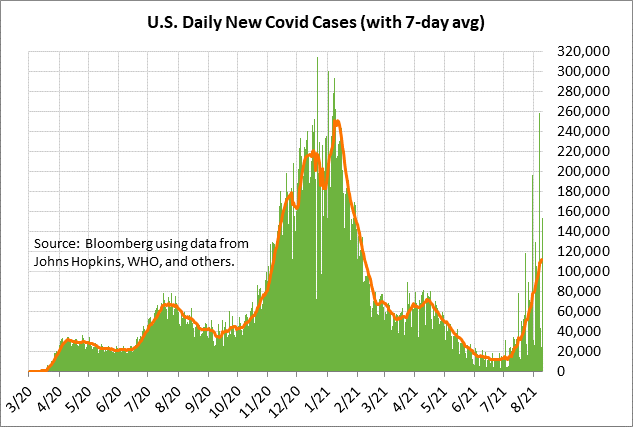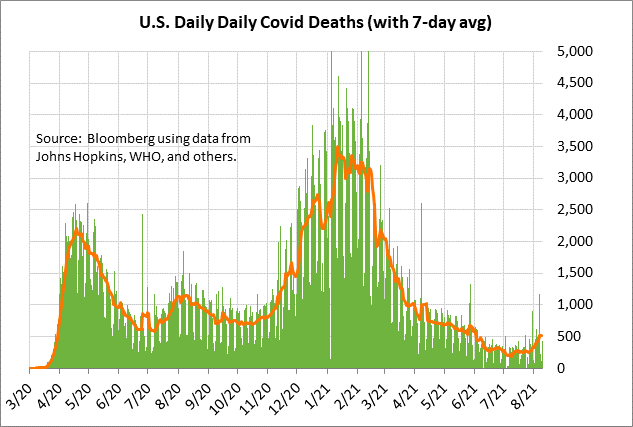- Senate expected to approve infrastructure bill by today and move on to $3.5 trillion budget resolution
- Democrats prepare for a showdown with Republicans on the debt ceiling
- 3-year T-note auction to yield near 0.42%
- U.S. Covid infections post new 6-month high
Senate expected to approve infrastructure bill by today and move on to $3.5 trillion budget resolution — Senate Majority Leader Schumer has teed up the $550 billion bipartisan infrastructure bill to be approved by the Senate today. Mr. Schumer on Monday said, “It may have taken all weekend, but the Senate is now finally on the precipice of passing major bipartisan infrastructure legislation.” He said the procedural votes in the past several days have “put the bill on a glide path” for passage by Tuesday morning.
After passage, the bill will go to the House. However, House Speaker Pelosi has said the infrastructure bill won’t get a vote in the House until the Senate also passes the $3.5 trillion reconciliation bill this autumn.
After passing the infrastructure bill, the Senate later today will move to the consideration of the $3.5 trillion budget resolution, which contains the Democratic social spending priorities and tax hikes on corporations and wealthy taxpayers. The Senate is expected to pass that bill within the next day or two, allowing the Senate to leave for its August recess.
The budget resolution instructs the Senate Committees to write budget legislation by September 15. The Senate will then consider the reconciliation bill this autumn after they return from their August recess. The reconciliation bill will require all 50 Democratic Senators to vote in favor, but doesn’t need any Republican votes to pass.
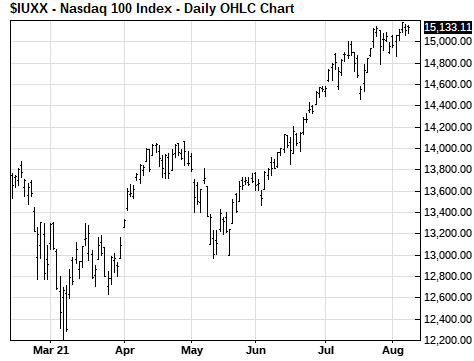
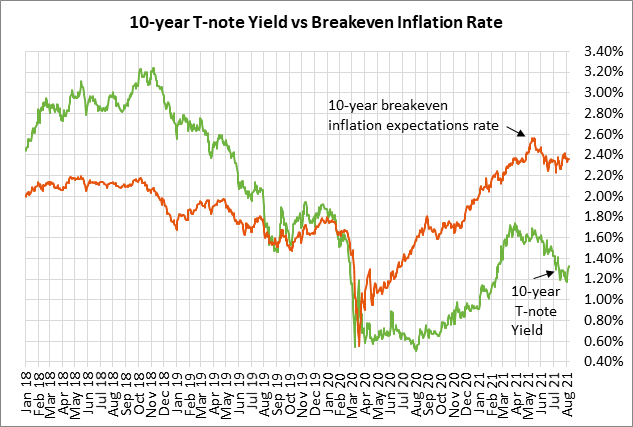
Democrats prepare for a showdown with Republicans on the debt ceiling — The $3.5 trillion budget resolution, released by Democrats on Monday, did not contain a debt ceiling hike or suspension, which was in line with recent reporting.
Democrats could have included a debt ceiling hike in the budget resolution and passed it without the need for Republican support to get past a filibuster. However, Democrats do not want to be blamed solely for the recent surge in the budget deficit. Also, the inclusion of a debt ceiling hike in the reconciliation bill could make it harder for Democrats to keep their caucus together to approve the reconciliation bill.
The markets now face another major Washington battle over a debt ceiling hike, with the implicit threat of a Treasury default. Democrats are likely to package a debt ceiling hike with the continuing resolution that will be necessary to keep the government open when the new fiscal year begins on October 1. The markets must therefore brace for the dual-threat of a government shutdown on October 1 and a Treasury default sometime during October or November when the Congressional Budget Office says the Treasury will hit its X-date and run out of cash.
Senate Minority Leader McConnell on Monday insisted that Republicans will have no part in raising the debt ceiling. He said that the Democrats could pass debt ceiling themselves through the reconciliation bill if they wanted to. Both parties seem willing to play hardball again this autumn over the threat of a government shutdown and Treasury default, with the markets suffering the consequences.
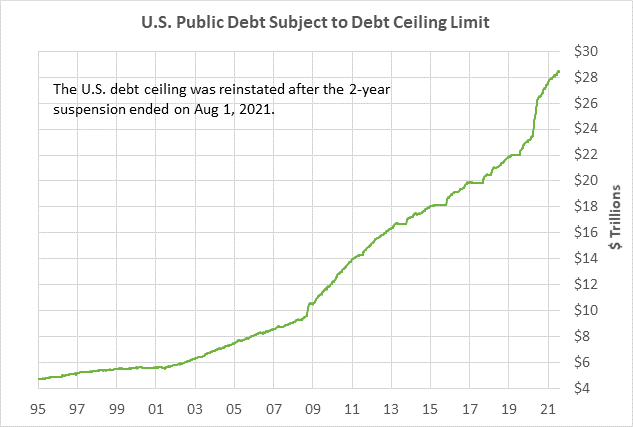
3-year T-note auction to yield near 0.42% — The Treasury today will sell $58 billion of 3-year T-notes. The Treasury will then continue this week’s $126 billion quarterly refunding operation by selling $41 billion of 10-year T-notes on Wednesday and $27 billion of 30-year T-bonds on Thursday. The 10-year and 30-year auctions will be new securities as opposed to reopenings.
The benchmark 3-year T-note yield on Monday closed at 0.42%. The 3-year yield has moved sharply higher from last week’s 2-month low of 0.29% because of last Friday’s stronger-than-expected July payroll report of +943,000
The 12-auction averages for the 3-year are as follows: 2.42 bid cover ratio, $34 million in non-competitive bids, 2.9 bp tail to the median yield, 17.6 bp tail to the low yield, and 54% taken at the high yield. The 3-year is the least popular security among foreign investors and central banks. Indirect bidders, a proxy for foreign buyers, have taken an average of only 51.0% of the last twelve 3-year T-note auctions, which is far below the median of 61.2% for all recent Treasury coupon auctions.
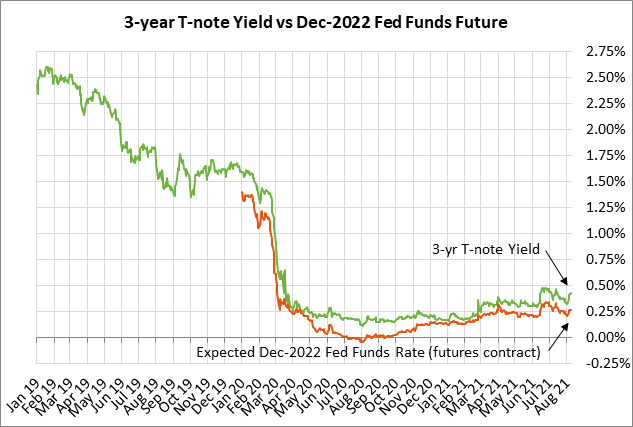
U.S. Covid infections post new 6-month high — The 7-day average of new U.S. Covid infections continues to rise sharply and posted a new 6-month high on Monday of 112,156, according to Monday’s preliminary data. In just the past six weeks, infections have risen by nearly ten times from the 16-month low of 11,351 posted on June 23.
The 7-day average of Covid deaths on Sunday rose to a 2-1/4 month high of 515 deaths, up from early-July’s 6-month low of 185 deaths.
According to the CDC, 50.2% of the total U.S. population has now been fully vaccinated, and 58.8% of the population has received at least one vaccination dose.
